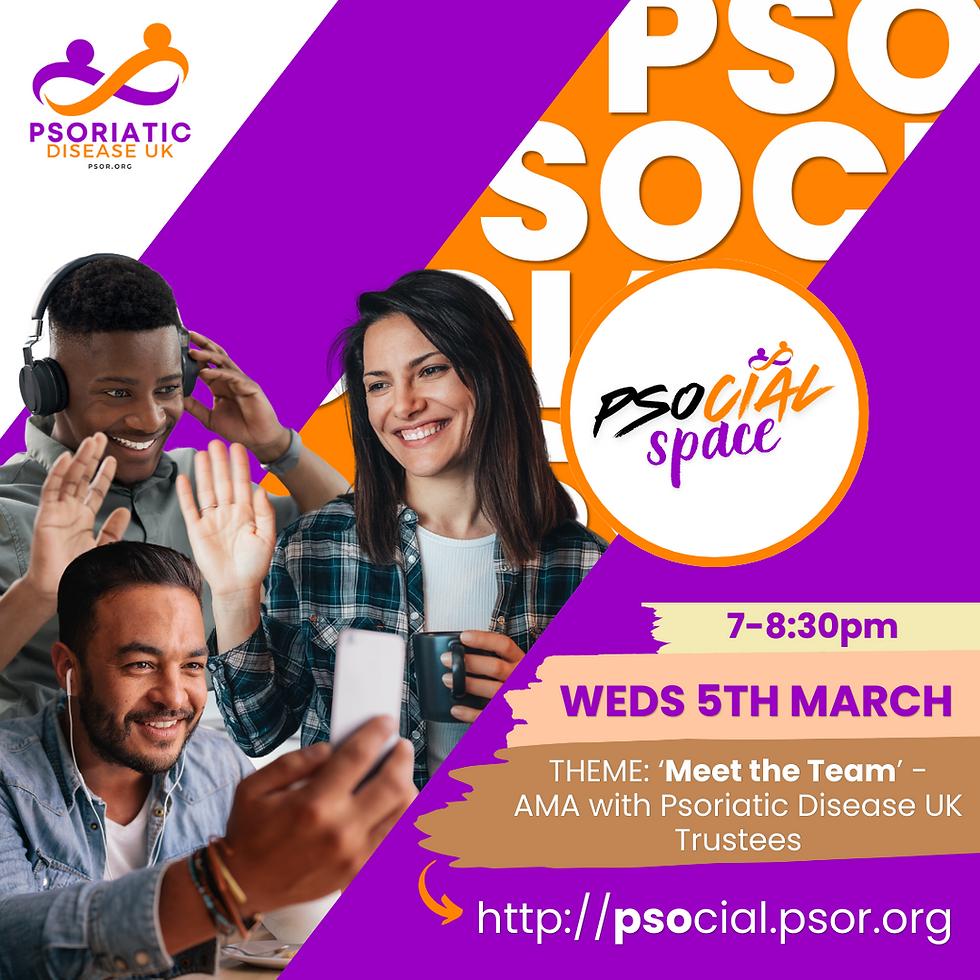Discover the Power of Peer Support Networks
- Psoriatic Disease UK

- Oct 9, 2025
- 4 min read
Living with psoriatic disease can feel isolating at times. The ups and downs, the daily challenges, and the emotional toll can weigh heavily on anyone. But here’s the good news: you don’t have to face it alone. There’s a powerful resource that many overlook but can transform your experience - peer support systems. These networks connect people who truly understand what you’re going through, offering encouragement, advice, and a sense of belonging.
Let us take you through why peer support systems matter, how they work, and how you can get involved to make your journey a little easier and a lot more hopeful.
Why Peer Support Systems Matter for Psoriatic Disease
When you’re managing a chronic condition like psoriatic disease, medical treatment is crucial. But emotional and social support? That’s just as important. Peer support systems provide a unique kind of help that doctors and family members might not be able to offer.
Shared Experience: Connecting with others who live with psoriatic disease means you’re talking to people who truly get it. They understand the flare-ups, the treatments, and the emotional rollercoaster.
Practical Advice: From managing symptoms to navigating healthcare, peers can share tips that have worked for them.
Emotional Comfort: Sometimes, just knowing you’re not alone can lift a huge weight off your shoulders.
Empowerment: Being part of a community encourages you to take charge of your health and wellbeing.
These systems create a safe space where you can be open, ask questions, and find encouragement. They help reduce feelings of isolation and build resilience.

How Peer Support Systems Work
Peer support systems come in many forms, from face-to-face groups to online communities. Here’s how they typically function:
Group Meetings: Regular gatherings where members share experiences, discuss challenges, and celebrate successes.
One-on-One Support: Pairing individuals for more personal, focused support.
Online Forums and Social Media: Virtual spaces where people can connect anytime, anywhere.
Educational Workshops: Sessions led by peers or professionals to provide information and skills.
Resource Sharing: Access to helpful materials, advice on treatments, and guidance on managing daily life.
The key is that these systems are led by people who have lived experience with psoriatic disease or caregiving. This peer-led approach builds trust and understanding.
If you want to explore joining a peer support network, you’ll find a welcoming community ready to support you.

What is the meaning of peer support?
At its core, peer support means people with similar experiences coming together to help each other. It’s about mutual respect, empathy, and shared understanding. Unlike traditional support from professionals, peer support is based on equality - everyone has something valuable to offer.
Peer support is not just about talking; it’s about listening, learning, and growing together. It’s a two-way street where everyone benefits. For example, someone newly diagnosed might gain hope and practical tips, while a long-time member might find purpose and satisfaction in helping others.
This kind of support can improve mental health, boost confidence, and even encourage better management of physical symptoms. It’s a powerful tool that complements medical care perfectly.

How to Get Involved and Make the Most of Peer Support
Getting involved in a peer support system is easier than you might think. Here are some practical steps to help you start:
Find a Group: Look for local or online groups focused on psoriatic disease. Organisations like Psoriatic Disease UK offer great options.
Attend a Meeting: Join a session to see how it feels. You don’t have to speak if you’re not ready - just listening can be helpful. If you would like to start an in-person support group in your area, get in touch.
Be Open: Share your experiences honestly. The more you give, the more you get.
Ask Questions: Don’t hesitate to seek advice or clarification.
Offer Support: When you feel ready, support others. It’s rewarding and strengthens the community.
Use Online Resources: Many groups have forums, social media pages, or newsletters to keep you connected.
Stay Consistent: Regular participation helps build relationships and trust.
Remember, peer support is flexible. You can engage as much or as little as you want. The important thing is to find what works for you.
The Last Word on Building a Supportive Community
Being part of a peer support system is about more than just managing psoriatic disease. It’s about building a community where everyone feels valued and understood. Together, we can break down the barriers of isolation and stigma.
If you or someone you care about is living with psoriatic disease, consider exploring the benefits of a peer support network. It’s a step towards a stronger, more connected, and hopeful future.
You don’t have to walk this path alone. There’s a whole community ready to walk with you. Let’s discover the power of peer support systems together.
Want to try an online peer support community and see if it can help you? Why not start with these Psoriatic Disease UK-run groups...
Private and tight-knit
Fresh and modern peer support
Make use of free group video calls with other members
Play free games with others to socialise and distract
Join our Monthly PSOcial Space Hangout
Public and bustling with conversation
Tens of thousands of members
Share experiences with others from around the world
Familiarity with Facebook
Traditional online peer support
100's of topics discussed daily







Comments